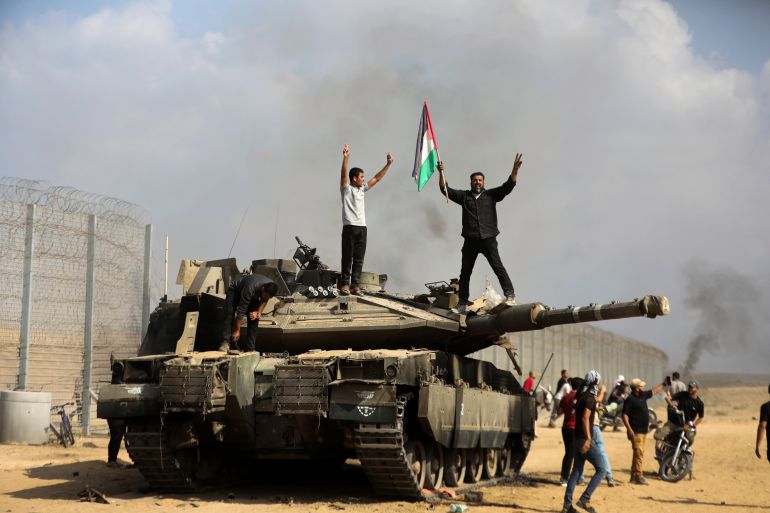The recent crisis in West Asia has brought the world’s attention to the long-standing and deeply rooted conflict between Israel and Hamas. The latest wave of violence was triggered by a large-scale attack from Hamas, which resulted in the killing and abduction of thousands of Israeli Jews. This brutal act has been widely condemned as a terrorist attack, given the nature and scale of the violence inflicted on innocent civilians. However, The Dilemma of international response in Israel-Hamas is that, many nations and UN directing criticism towards Israel rather ,the perpetrators of the attack.
)
The Nature of the Conflict
Hamas, recognized as a terrorist organization by numerous countries including the United States and the European Union, has a history of committing acts of violence against Israel. The group’s ideology is rooted in the destruction of Israel and the establishment of an Islamic state in its place. The recent abductions and killings carried out by Hamas are a continuation of their long-standing strategy of using terror to achieve political and ideological goals. These actions not only constitute a grave breach of international law but also represent a direct attack on the sovereignty and security of Israel.
The Response of the International Community
The international community’s response to this crisis has been varied. While some countries and organizations have unequivocally condemned the attacks by Hamas, others have taken a more critical stance towards Israel’s retaliatory measures. This divergence in responses highlights the complex and often politicized nature of international diplomacy regarding the Israeli-Palestinian conflict.

The United Nations (UN) and the International Court of Justice (ICJ) have faced criticism for their perceived lack of focus on the initial acts of terror by Hamas. Instead, much of the discourse has shifted towards Israel’s military response. Critics argue that this shift in focus is illogical, unethical, and illegal, as it seems to downplay the severity of the initial terrorist acts and the suffering of the abducted Israelis and their families.
The Ethical and Legal Imperatives
From an ethical and legal standpoint, the primary focus of the international community should be the immediate release of the abducted Israelis and the prosecution of those responsible for these heinous acts. The abduction of civilians is a gross violation of international humanitarian law, including the Geneva Conventions, which explicitly prohibit the taking of hostages and call for the protection of civilians during conflicts.
The international community has a moral obligation to prioritize the safety and security of innocent civilians. This entails exerting diplomatic and economic pressure on Hamas to release the abducted individuals and to cease their terrorist activities. Moreover, international institutions such as the UN and the ICJ should actively work towards holding Hamas accountable for their actions. This includes investigating and prosecuting those responsible for planning and executing the attacks.
The Role of Israel
Israel, in its efforts to rescue the abducted individuals and to prevent further terrorist attacks, has undertaken military operations in Gaza, where Hamas is based. These operations have sparked significant controversy and debate. Critics argue that Israel’s actions are disproportionate and result in civilian casualties. However, it is important to recognize the context in which Israel is operating. The primary responsibility of any government is to protect its citizens from harm. In the face of a terrorist organization that has explicitly targeted civilians, Israel’s actions can be seen as a legitimate exercise of its right to self-defense.
International law recognizes the right of nations to defend themselves against armed attacks. This right is enshrined in Article 51 of the United Nations Charter. While the use of force must comply with the principles of necessity and proportionality, the complexities of urban warfare and the tactics employed by Hamas, such as using civilian areas for military operations, complicate the situation. This does not absolve Israel from its responsibility to minimize civilian casualties, but it does provide a framework for understanding the challenges it faces in responding to terrorist threats.
Moving Forward: A Call for a Balanced Approach
The current crisis underscores the need for a balanced and nuanced approach from the international community. This involves recognizing the legitimate security concerns of Israel while also advocating for the protection of civilian lives on both sides of the conflict. A balanced approach would include:
- Condemning Terrorism: The international community must unequivocally condemn the terrorist acts committed by Hamas. This includes acknowledging the pain and suffering of the Israeli victims and their families.
- Demanding Accountability: There should be a concerted effort to hold Hamas accountable for its actions. This includes international investigations and potential prosecutions for war crimes and crimes against humanity.
- Supporting Peace Efforts: While addressing the immediate crisis, it is crucial to support long-term peace efforts. This involves facilitating dialogue between Israel and Palestinian representatives committed to a peaceful resolution of the conflict.
- Providing Humanitarian Aid: The international community should provide humanitarian assistance to those affected by the conflict, ensuring that aid reaches civilians in need without being diverted by militant groups.
- Encouraging Compliance with International Law: Both Israel and Hamas must be encouraged to comply with international humanitarian law. For Israel, this means taking all feasible measures to protect civilian lives during military operations. For Hamas, this means ceasing the use of civilian areas for military purposes and stopping all acts of terrorism.
Conclusion
The crisis in West Asia, triggered by the killing and abduction of Israeli Jews by Hamas, has exposed the complexities and challenges of addressing terrorism within the framework of international law and diplomacy. While Israel’s response has been met with criticism, it is essential to understand the broader context of self-defense and the protection of its citizens. The international community must focus on the real criminals and offenders, namely Hamas, and prioritize the release of the abducted individuals. This requires a balanced approach that condemns terrorism, demands accountability, supports peace efforts, provides humanitarian aid, and encourages compliance with international law. Only through such a comprehensive and balanced strategy can a just and lasting resolution to the conflict be achieved.



Leave a Reply